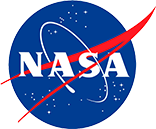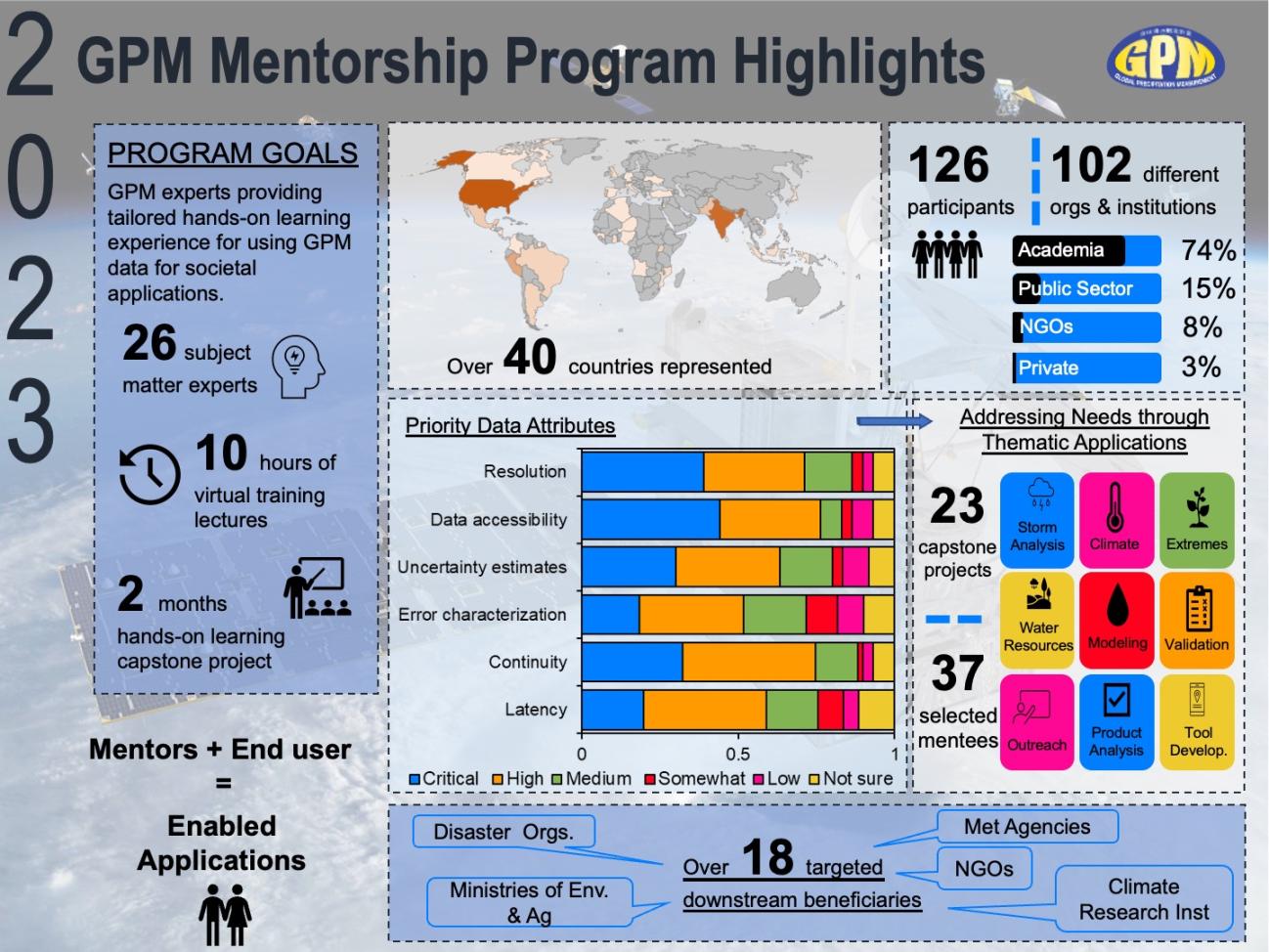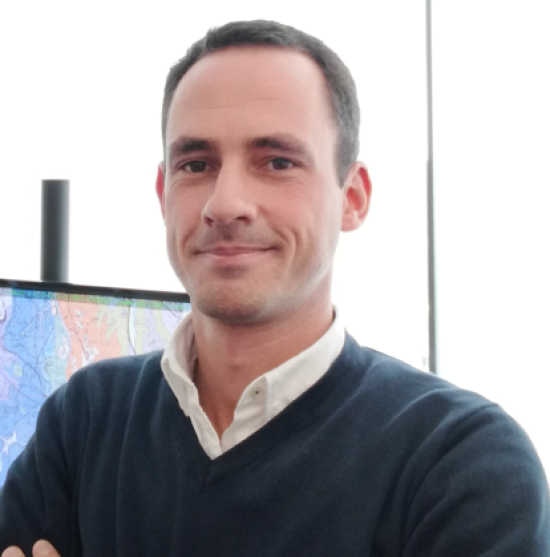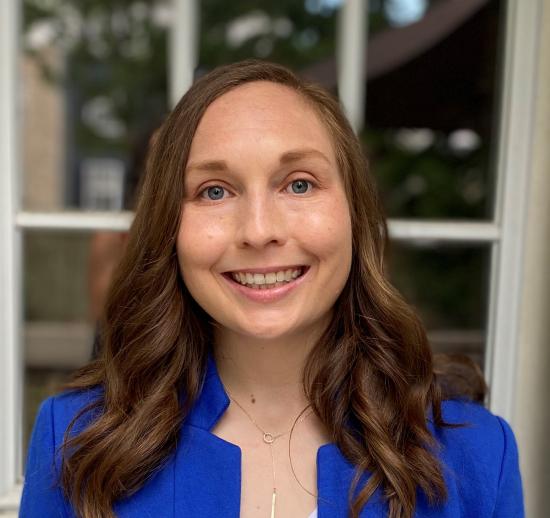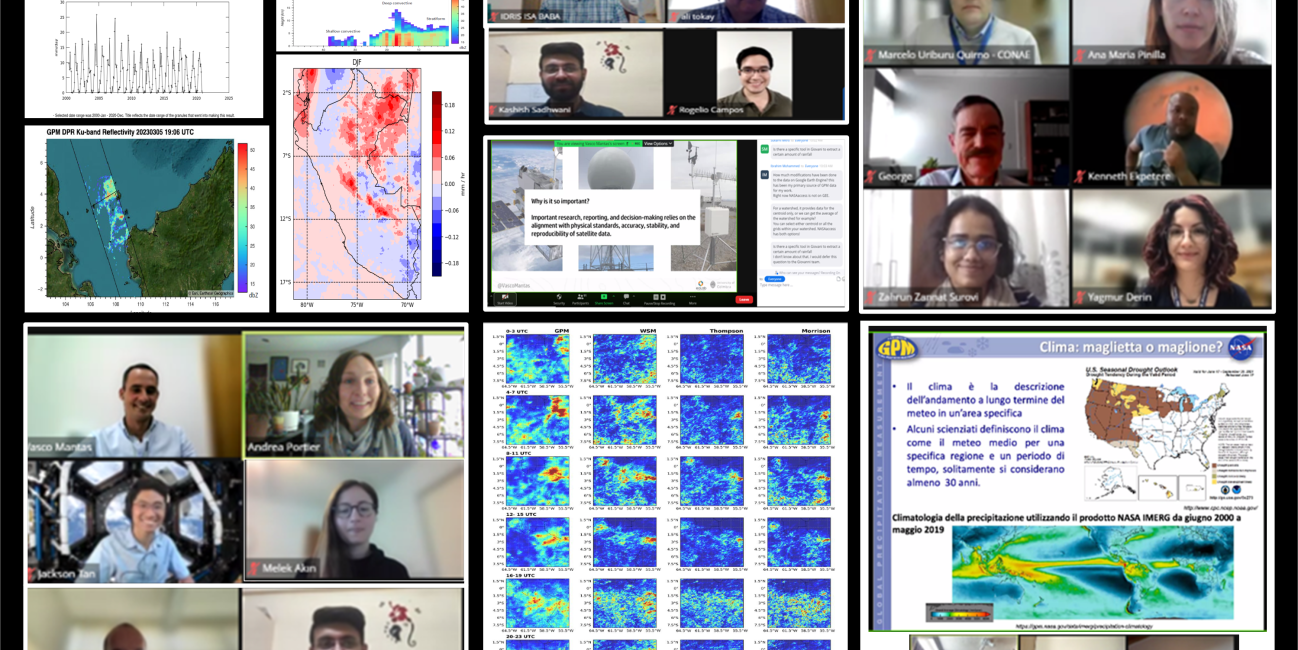
2023 GPM Mentorship Program
In 2023, NASA’s Global Precipitation Measurement Mission Applications Team and University of Coimbra’s Earth and Space Science Center (CITEUC Portugal) collaborated to host the second edition of the GPM Mentorship Program. The initiative supported new and existing user communities, providing a tailored hands-on learning experience in using GPM data for applications. It gave participants an overview of state-of-the-art GPM satellite-based precipitation estimates and provided users with examples of applying GPM data to support real-world problems. The program offered a free, online, and incremental training program for participants that was designed for active learning, aiming to reduce data barriers and allow them to effectively use GPM products to make informed decisions.
In 2023, NASA’s Global Precipitation Measurement Mission Applications Team and University of Coimbra’s Earth and Space Science Center (CITEUC Portugal) collaborated to host the second edition of the GPM Mentorship Program. The initiative supported new users from established and underrepresented user communities, providing a tailored hands-on learning experience in using GPM data for applications. It gave participants an overview of state-of-the-art GPM satellite-based precipitation estimates and provided users with examples of applying GPM data to support real-world problems. The program offered a free, online, and incremental training program for participants that was designed for active learning, aiming to reduce data barriers and allow them to effectively use GPM products to make informed decisions.
All 2023 training session presentations and recording are available through the CITEUC webpage
The 2023 GPM Mentorship Program trainings and projects took place online across a period of three months. Over 126 people participated in five 2-hour weekly lectures focusing on the GPM mission, as well as GPM data products, technologies, and applications. A cohort of 37 participants were selected as mentees to partner with GPM experts and each develop a capstone project using GPM data for applications. Each project focused on topics agreed upon by both the mentor and mentee, catering to their skills and application interests. The program’s goal is for mentees to become local resources for sharing GPM products and best practices, laying the foundations for further GPM data use in their communities.
Program Benefits:
- Build participant’s capacity to use precipitation data and expand the tools and resources available for decision-making efforts.
- Partnering with a GPM subject-matter expert empowers participants to self-sustainably use GPM data for research and analysis conducted during the capstone.
- Each project creates opportunities to identify methods, analyze results, and create deliverables tailored to the participant’s skills and interests that can be used to enhance applications.
Mentees & Projects
Alan Vaz Lopez - Characterizing Tropical Droughts Using GPM Data
Amy Molina Estrada - Improving Water Resource Management Practices using GPM
Ana Maria Pinilla - Hydrological Modeling with GPM IMERG
Chetan Gurung - Investigating Diurnal Cycle of Precipitation in the Amazon Rainforest
Carlo Montes - Using IMERG in Monitoring Rainfall and the Midsummer Drought in Honduras
Clara Avila Dea Permata - Evaluation of Rainfall During the Borneo Vortex Event using IMERG and DPR
Daniel Aduragbemi Aderotoye - Investigation of the Performance of IMERG over Nigeria
Edson Baptista - Impact of Climate Change in SW Angola: Discovering Solutions with GPM
Gianella Botetano Bastidas - Spatial Downscaling of IMERG Final Over the North Coast of Peru
Giorgio Dalmasso - Exploring GPM Data via the NASAaccess Tool
Gustavo De la Cruz - Evaluation of IMERG Products for Daily Precipitation Analysis Over Peru
Idris Isa Baba - Assessing Impact of Climate Change in Northern Nigeria
Kaman Ghimire - Evaluation of IMERG Over Nepal’s High Himalayan Region
Kashish Sadhwani - Comparing the Performance of IMERG: Implications for Streamflow Simulation
Kenneth Ekpetere - IMERG Precipitation Extractor Tool
Marcos Roberto Benso - Ground Validation of Hourly IMERG in Brazil
Melek Akin - Analysis of a Flash Flood Event using GPM Data
Prosper Ayabagabo - Hail Detection Using GPM Data Over Rwanda
Rogelio Campos - El Niño and La Niña Events: Comparison of Monthly Precipitation in Peru
Rojan Lamichhane - Investigating the Application of IMERG in Ungauged Regions in Nepal
Santiago Villar - Evaluation of IMERG for Drought Classification
Zahrun Zannut - Understanding Data Access Tools to Assess Urban Flooding Events
Mentors
Program Leads
2023 GPM Mentorship Program Coordinator: Vasco Mantas
Affilation: University of Coimbra, Earth and Space Science Center (CITEUC) - Coimbra, Portugal
Project Mentees: Precipitation Extremes Mentee Cohort (Amy Molina; Ana Ligia Arancibia; Carlo Montes; Daniel Aderotoye; Edson Baptista; Gustavo de la Cruz; Idris Baba; Zahrun Zannat)
Why are you coordinating this program and participating in this program as a mentor?
The amazing wealth of remote sensing data now available is only valuable if users around the world can understand it, access it, and integrate it into research and applications. This is a complex endeavor, and it means that the path to go from novice to experienced user is often arduous and lengthy. Programs such as these can make the learning curve less steep, or at least less daunting, by connecting experienced researchers with new users. The dialogue the program enabled with the users and within the community was very enjoyable.
What is your area of expertise and how does GPM fit into your research?
My interest in GPM is primarily focused on the application and validation of gridded products, like IMERG. I use the products to study the impact of precipitation over land cover dynamics, and enjoy working with users designing applications catered to their needs.
What is a challenge you often notice by users with using remote sensing data? Any advice to overcome this challenge?
Understanding uncertainties and errors, especially when going from a global to a regional or local level. End-users often voice this concern. My advice is to study the literature thoroughly, reach out to algorithm developers, analyze similar cases where the data was applied (if available) and, if still needed, design and implement an independent validation study. Throughout the process, document everything and be transparent when communicating the advantages and disadvantages of the products you or the end-users you are working with.
2023 GPM Mentorship Program Coordinator: Andrea Portier
Affiliation: NASA Goddard Space Flight Center, Science Systems and Applications, Inc (SSAI)., Maryland, USA
Project Mentees: Precipitation Extremes Mentee Cohort (Amy Molina; Ana Ligia Arancibia; Carlo Montes; Daniel Aderotoye; Edson Baptista; Gustavo de la Cruz; Idris Baba; Zahrun Zannat)
Why are you coordinating this program and participating in this program as a mentor?
Over the years, satellite precipitation data have enabled a wealth of applications that address societal needs. However, users often experience difficulty accessing, processing, and applying the data to enable these applications. I believe that providing opportunities to decrease barriers to engagement and learning and connecting experts to end users can greatly facilitate precipitation data usage for applications. Additionally, by working directly with end users, one gains an understanding of their needs and what’s important to them. This program created a space for this dialogue and an opportunity to learn from others.
What is your area of expertise and how does GPM fit into your research?
I am the NASA GPM Mission Applications Lead. For this role, my goal is to engage with different stakeholder communities to understand and quantify how GPM satellite data products are applied for decision-making and provide opportunities to educate potential users about how this data can benefit their work and lives. By being part of this program, it allowed me to understand participants’ needs and requirements for satellite precipitation data and deliver efficient and effective resources to support and enable their decision making.
What is a challenge you often notice by users with using remote sensing data? Any advice to overcome this challenge?
Understanding which products to use and where to access data products for applications can often be overwhelming. My advice is to take a step back and ask yourself - what are my data needs? What spatial and temporal resolutions can I work with? What time period do I need data for? And in what formats? I would then suggest studying the literature thoroughly, reaching out to data developers, and looking into similar case studies related to your work. Additionally, make use of any data tutorials available. I would encourage end users to review these resources too. Getting a thorough understanding of data products available and examples of how others are using the data can be helpful and guide you in a direction that fits your needs. And again, don’t hesitate to reach out to a mission and its data developers. For example, the GPM mission has a contact form and we (the GPM Team) strive to answer your questions through this form!
2023 Mentors
GPM Education Mentorship Program
For the 2023 GPM Mentorship Program, program leads initiated the GPM Education Mentorship Program as a separate capstone project. This pilot effort connected a GPM expert with middle- and high-school teachers to learn about the water cycle, climate change and precipitation through the lens of the GPM mission. For information about this initial GPM Education Mentorship Program, please read Lisa Milani’s bio for more information on her efforts working with teachers in Italy.
In addition to learning about the GPM mission, teachers did the following:
- Disseminated and passed knowledge to students.
- Participated in weekly discussions.
- Demonstrated knowledge through development of student-led projects around precipitation measurements.
